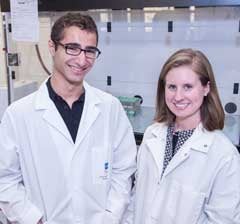 KINGSTON, R.I., Nov. 17, 2014 – For several years, the University of Rhode Island, partnering with Rhode Island Hospital, has offered a program for students with a passion for physics and medicine – and now it’s reached a milestone.
KINGSTON, R.I., Nov. 17, 2014 – For several years, the University of Rhode Island, partnering with Rhode Island Hospital, has offered a program for students with a passion for physics and medicine – and now it’s reached a milestone.
The five-year medical physics degree, which combines a bachelor of science in physics with a master of science in medical physics, has won accreditation from the Commission on Accreditation of Medical Physics Education Programs.
The accreditation from the nonprofit group is especially noteworthy since the URI program is one of only two accredited medical physics programs in New England. (The other program is at the University of Massachusetts, Lowell.) The recognition also comes at a crucial time as high school students who want to study science in college begin to explore schools.
“Medical physics is an expanding field, and we’re proud at URI to offer one of the best programs in New England,” said Yana Reshetnyak, a URI physics professor and co-director of the program. “Medical physics is a very attractive profession for young bright students who enjoy physics and medicine. The program is a wonderful way to boost Rhode Island’s economy and invest in the state’s future.’
’
Job opportunities in medical physics are expanding as patient care involves more complex technology. Many medical physicists find work in the areas of medical imaging, radiation therapy and nuclear medicine, with a focus on the treatment of cancer, heart disease and mental illness.
Medical physicists play a vital role planning care for patients and ensuring the performance of equipment to treat cancer, perform nuclear medicine procedures and acquire diagnostic medical images (computerized tomography, or CT scans, and magnetic resonance imaging, or MRIs).
The URI program was launched in 2011 in collaboration with Rhode Island Hospital, which offers classes and practical, hands-on experience using a wide variety of state-of-the art cancer treatment and medical imaging equipment.
Students take rigorous physics courses, as well as medical physics classes. They apply to the master’s program in their junior year, and, if accepted, take medical physics courses for two more years. After they finish, they do a two-year residency and, ultimately, seek board certification.
Students who have already earned their bachelor’s degree – at URI or another college – can earn their master’s in medical physics by taking the additional medical physics courses. Students would also do a clinical rotation and seek certification.
Graduates often find jobs in hospitals, universities and private companies that design imaging and radiation machines. Some graduates pursue their doctorates in medical physics or related fields, such as medical engineering. The program is also excellent preparation for medical school.
The URI program is the brainchild of Reshetnyak and her husband, Oleg Andreev, who joined the physics department in 2004. Andreev, also a physics professor, is department chair. Michael Price, medical physicist-in-chief at Rhode Island Hospital, is co-director of the program.
Reshetnyak and Andreev are recognized worldwide for discovering a technology that can detect and treat cancerous tumors. The treatment involves the use of delivering nanogold particles into a tumor. Those particles absorb more radiation, so there is a lethal dose to the tumor but not surrounding cells.
Price is a nationally recognized expert in clinical radiotherapy physics and brachytherapy, a cancer treatment that uses small pieces of radioactive material to treat cancer. He recently joined Rhode Island Hospital from the University of North Carolina, where he served as the director of Clinical Medical Physics and Dosimetry.
“The URI medical physics program offers a unique combination of teaching and research, as well as clinically-focused training, essential in preparing young medical physicists to excel in a variety of clinical and academic environments,” said Price. “By offering a world-class graduate program in Rhode Island, partnered with Rhode Island Hospital, our goal is to attract exceptional students to train and retain as experts to satisfy the growing need for quality medical physicists.”
The accreditation puts URI’s medical physics program on the map.
“Students who enjoy science and math and want to apply their talents to the medical field have an opportunity to go from high school seniors to residency in medical physics in five years,” said URI physics professor Leonard Kahn, co-director of the graduate program in physics. “Our program offers a unique blend of theory and practice, giving students a tremendous opportunity to succeed in this demanding profession.”
Click here for more information about the accreditation. Click here for information about URI’s physics department or call Kahn at 401-874-2053.
“I congratulate our faculty in physics and their colleagues at Rhode Island Hospital for this impressive program that is now accredited,” said Winifred Brownell, dean of the College of Arts and Sciences. “Students who major in medical physics at URI will have exciting career opportunities that will apply cutting-edge science to improve diagnosis and treatment of a variety of health challenges.”
Photo above: Jennifer Daniels and Troy Crawford, students in the medical physics program at the University of Rhode Island, one of two accredited programs in New England. Photo by Michael Salerno Photography.

